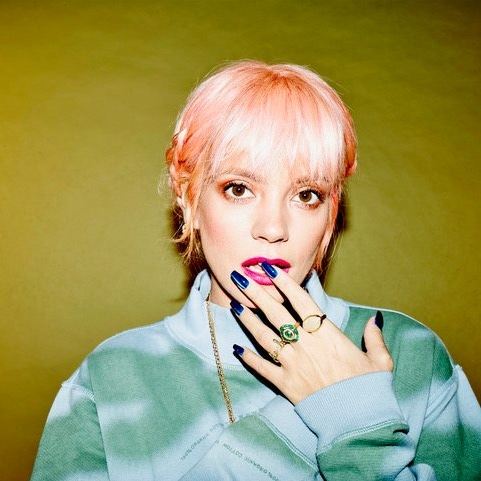

Lily Allen
‘This is trouble,’ I thought, the first time I saw the girl coming.
She was hopping across the sunlit backstage area, dressed as a blue pixie, laughing. Her eyes were like black, bottomless saucers. A man said something rude to her and she turned around, smiled sweetly, and then tore him to pieces. I had no idea who she was – she was just this fizzing cocktail of innocence, fun and abuse. It was at Bestival, on the Isle of Wight, in the summer of 2006. She was barely twenty and, as it turned out, she had just recorded her first number one.
The next time I saw her was after an awards ceremony, in a pub in Mayfair. I knew who she was now. Everyone knew who she was now. She was sitting at a table surrounded by men in expensive suits. There was iced champagne on the table but she looked sad and faraway, like she was being forced to play a game she wasn’t interested in anymore. It was the winter of 2010 and a lot of life, a lot of experience, had happened to her in the four years since I first saw her.
I saw her again, recently, across a crowded London restaurant. She was talking, emphasizing a point she was making with a sharp swipe of her hand. She looked happy, clear-eyed, her perfect white teeth bared in a smile. She was twenty-eight now, a wife and a mother of two.
When you listen to Lily Allen’s new album it sounds just like that sharp swipe; like a decade of experience, heartbreak, joy, mischief, pain, trouble and fun: the whole of your twenties wrapped in sleek, brilliant pop music.
On Sheezus her talent lies not just in mentioning that women get periods in a pop song, but in gleefully mentioning it three times in the same line. And all of this while the lyric goes about its business of dissecting exactly why women in music are automatically assumed to be in some kind of bear pit with each other.
Then you listen to L8 CMMR, which is not so much about a party guest, or someone slow to latch onto trends, but about your lover’s powers of delayed ejaculation and your face lights up as you realize that there is much here that will offend all the usual people. And so what? As the late Sid Vicious said, ‘I’ve met the man in the street. And he’s a cunt.’
And then I saw the girl again, on my television. She was singing ‘It’s hard out here for a bitch’ while pretending to hop across the screen like a little bunny, like she was doing at Bestival, all those years ago. Like you never see any of those other women do, in their race to be the sexiest, the raunchiest, the nastiest one on the block.
And I thought – wow.
Somehow, after seven years in this terrible racket, this sausage factory of the soul, she never lost sight of herself. She’s a wife and a mother and a Global Recording Star (as they say in America) and somehow, still, she’s that saucer-eyed 20-year-old pixie, galloping across a field. She kept her innocence.
I must ask her how she did that sometime.
Lily Allen has been called all these things, and much, much more - sometimes with justification, often without. She’s posh, she’s common, she’s sexy, she’s demure, she’s reticent, she’s outspoken, she’s sensitive, she’s shameless, she’s loved-up, she’s distraught, often all in the same evening. Then she goes to bed, gets up and has breakfast. Then she posts her breakfast on the Internet. Then other people analyse her breakfast. And wonder why she posted it on the Internet.
Contrary, contradictory, occasionally catty, always compelling, Allen, at 23, is Britain’s most consistently engaged and engaging pop star, as well as one of our most successful.
She first commandeered the public stage in July 2006, a fully formed phenomenon with a song that would help define that summer, the hugely infectious “Smile”, her first CD single and her first UK number one. “Smile” served as an excellent primer for the Allen oeuvre, a breezy, lilting, ska-inflected slice of perfect pop distinguished by sugar-sweet vocals and unflinchingly autobiographical lyrics. It was a song of female empowerment sung by a smart-mouthed, wide-eyed, pretty post-teen in a pink prom dress and box-fresh Nike trainers, fluoro make-up and huge hoop earrings.
“LDN” was, if anything, even more insidious and distinctive: a faux-naïve, text-spelt, profane paean to the city of her birth in all its grimy glory.
By the time of the release of “Alright, Still”, her debut album, Allen’s stardom was solidified and her public persona cemented: cheeky, waspish, searingly honest, sparky, spiky and satirical. Some of the stories about her were even true.
Lily Allen was born in May 1985 in Hammersmith, west London, the daughter of film producer Alison Owen and actor Keith Allen. It was an unconventional childhood, but not one without its compensations, and it made Allen wise beyond her years and tremendously motivated to carve her own place in the world. Raised alongside her sister and brother in Bloomsbury, Shepherd’s Bush, Primrose Hill and Islington, she attended 13 different schools in total before abandoning her formal education at 15 and embarking on a teenage odyssey of innocence and experience: clubbing in Ibiza, studying to be a florist, always hoping to break into the entertainment industry.
She knocked on record company doors from the age of 16, and her first deal came in 2002, with Warners, who pushed her in an uncomfortably folky direction. It was two years later, working with producers Future Cut, when Allen began to find her feet as a songwriter. In 2005 she signed to Regal, an imprint of Parlophone, and, frustrated by the slow pace of the music industry, began to post demos on her MySpace page. Meanwhile, a series of live appearances at the Notting Hill nightclub Yo-Yo in the spring of 2006 whetted press and public appetites.
Meanwhile, Allen provided guest vocals on songs by Robbie Williams, Dizzee Rascal and Basement Jaxx, among others, and made a specialty of unexpected cover versions. As well as her hit interpretation of the Kaiser Chiefs’ “Oh My God” alongside Ronson, she has covered The Kooks, The Pretenders and Blondie, and offered a sardonic reworking of 50 Cent’s “Window Shopper”.
Those people will be interested to learn that “It’s Not Me, It’s You” might be the only album they’ll hear in 2009 that references racism (“Fuck You”); ageism (“22”); the dark side of celebrity and consumer culture (“The Fear”); drug dependency (“Everyone’s At It”); and 9/11 (“Him”); but also TV dinners (“Chinese”); premature ejaculation (“Not Fair”); the enduring rubbishness of men (“Never Gonna Happen”), as well as the fragile beauty of early romance (“Who’d Have Known”).
“It’s Not Me, It’s You” is unmistakably Her: bracing home truths and pungent social commentary delivered in the voice of an angel. It’s a potent combination. It could only be Lily Allen.




